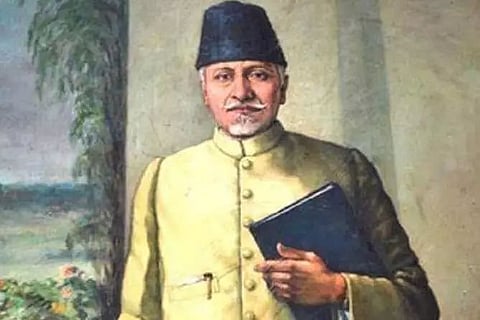
- Home
- Live Blog
- Breaking News
- Top Headlines
- Cities
- NE News
- Sentinel Media
- Sports
- Education
- Jobs

Vinod C Dixit
(dixitpatrakar@yahoo.in)
November 11 is celebrated as National Education Day to commemorate the birth anniversary of Maulana Abul Kalam Azad, the first Education Minister of independent India, who served from August 15, 1947 until February 2, 1958. The entire nation honours the contribution made by Maulana Abul Kalam Azad on this day, which is also known as Rashtriya Shiksha Diwas. National Education Day celebrates the improvements of the national education system in the country.
Maulana Abul Kalam was a scholar, activist and leader of the Congress party. He served as the Education Minister for eleven years. As a freedom fighter, Azad was the leader of the Khilafat Movement and helped organize the non-co-operation movement in 1919. Azad was a follower of the Gandhian philosophy. He also served as the president of the Congress party in 1923 and then from 1940 to 1945. Maulana authored several books, including 'India Wins Freedom' and 'Ghubar-e-Khatir'. There are many great men who made their invaluable contributions to make the country independent. Maulana Abul Kalam Azad's name comes in as such a great man whose sacrifice always reminds us of the unique and commendable work that he did for our society. He was unable to tolerate the word Ghulam with his name in any way, so he changed his name from Mohiuddin Haider to Abul Kalam Azad. This self-given name later become so popular that the real name was completely lost. He started the editing work of a literary magazine 'Lisanussidak' in 1902 at the age of 14. At that time, this magazine had created a great surprise. Apart from this, Azad did efficient editing of magazines like 'Un Nadav', 'Vakil', 'Darul Sultanate', etc. The magazine became so popular that not a single copy of it survived. It contained articles of national ideology. Ultimately 'Al Hilal' and Maulana Azad himself became the victims of the British.
When India became independent, Pandit Jawaharlal Nehru was elected the Prime Minister of the country. Impressed by the intense scholarship of Maulana Azad, Nehru appointed him the Education Minister of the country because the progress of any country depended on the education system. Azad had a pure philosophy for India's education. He played a significant role in the establishment of various educational institutions. Some of these are Indian Institute of Science and Jamia Milia Islamia. His most significant contribution was the establishment of the first Indian Institute of Technology in 1951. He was also responsible for creating and setting up the University Grants Commission in 1953 and emphasized setting up the Indian Institute of Science in Bangalore. Over the past few decades, a number of IITs have come up. The objective of celebrating National Education Day is described as strengthening India's educational institutions. We need to raise the quality of education and also to evaluate the country's current performance in the field. It is also seen as an opportunity to improve the current situation of education in India. Education is one of the fundamental human rights given to all citizens by the Constitution of India. Without knowledge and education, society cannot progress, which hampers the nation's overall progress. Maulana's heart was deeply pained by the horrific massacre of 1947. Maulana came after winning both the general elections of the Lok Sabha and remained the Education Minister of the country. During his tenure, Maulana laid the foundation of education policy for the progress of the country, he will always be remembered. People know him as a warrior of the pen. He established higher education institutions and also worked for free education in India.
Several leaders have remembered the contribution of Azad in building the foundation of a strong education system in the country. His invaluable contribution towards laying the foundation of a strong education system in independent India will be remembered forever. Let this day be a realization to motivate the young generation to strive for excellence in the field of education for the overall development of the country.